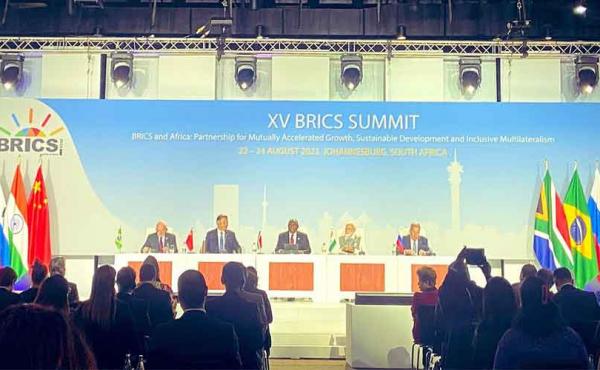
lot is happening in Pakistan. It is of immense importance to note that the world around us is changing rapidly, offering opportunities, every now and then that we cannot afford to ignore.
The BRICS meeting in Johannesburg, South Africa, from August 22 to 24, and the G20 summit in India on September 9 and 10, have set forth new developments in the regional as well as international context.
The BRICS is a group for economic cooperation through multilateralism. It includes Brazil, Russia, India, China and South Africa. These are leading economies of the world and expected to contribute 55 percent to the world’s economic growth in the year 2023. The BRICS has 40 percent of the world’s population, $26.03 trillion GDP and a consensus-based decision-making mechanism. It has established two financial institutions: the New Development Bank (NDB) and the Contingent Reserve Arrangement (CRA) with a capital base exceeding $100 billion to assist the member states.
This year, the group’s meeting was focused on expansion in the BRICS and launch of a unified currency and alternative financial system capable of disengaging trade among member states from American dollar. Out of the more than 20 countries aspiring for membership, six – the Kingdom of Saudi Arabia, the United Arab Emirates, Ethiopia, Argentina, Egypt and Iran – have been invited to join from January 1.
The G20 summit held in New Delhi, India on September 9 and 10, also permitted expansion of the group and inclusion of the African Union (55 countries). An agreement was reached on an India-Middle East-Europe Economic Corridor, also known as the Spice Route, to connect India with Europe via sea and rail links.
This is a significant development in that it appears to be a counter effort to China’s Belt and Road Initiative on the one hand and a step towards expediting India’s connectivity with Europe on the other. The G20 was formed in the year 1999 in response to the financial crisis in Asia. It was aimed at working together to resolve economic and political issues affecting the people of this area. The member states – the European Union plus 19 countries – account for 85 percent of the world’s economic output and more than 75 percent of the world’s trade and have two-thirds of the global population.
As regards the IMEC, Pakistan should be interested in such a development… If the Middle East and Europe are connected via rail and sea, Pakistan should benefit from it.
Pakistan must consider joining the BRICS which offers an alternative financial system through multilateralism. This can help it grow independent of the international financial institutions which mandate harsh restrictions impacting the well-being of the common man.
BRICS accounted for 35.2 percent of imports and 11.1 percent of the country’s exports in the year 2021. A major share of both imports and exports goes to China. The share can expand though it will not be an easy task.
There are certain impediments to Pakistan’s joining the BRICS. The first and the foremost is its poor economic health. The national economy is passing through a difficult phase.
The country has immense human resource potential, a youth bulge, minerals and a variety of terrain and sea. It requires an efficient tapping of the potential. We need to provide a stable political environment and an investor-friendly atmosphere. The new entrants to the BRICS have apparently been judged for their economic worth more than stability.
Another impediment for Pakistan is India which is likely to oppose Pakistan’s entry into BRICS on one pretext or the other. India should understand that the economic potential of the two countries needs to be used for the welfare of their people.
As regards the IMEC, Pakistan should be interested in such a development. If the Middle East and Europe are connected via rail and sea, Pakistan should also benefit from it. We can participate in both the development and execution of this plan. We can also propose connecting the IMEC with the CPEC.
Resolving the apparent hostility between the IMEC and the BRI can result in not only tangible economic benefits but also an enhancement of our political stature in the region.
The opportunities are immense. We need to realise their significance and exploit them to our advantage. There is a need for clarity on the part of the government in chalking out a strategy.
The writer works at the Institute of Regional Studies. She can be reached at reema.asim81gmail.com






